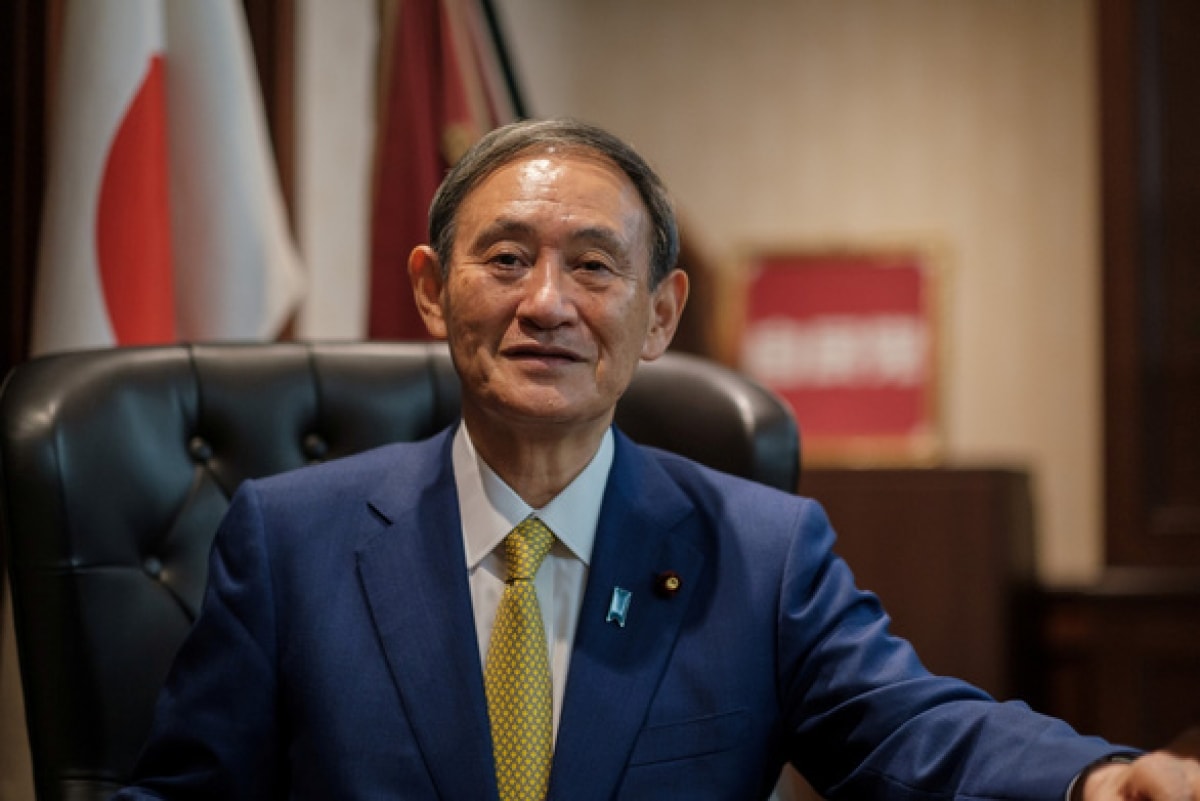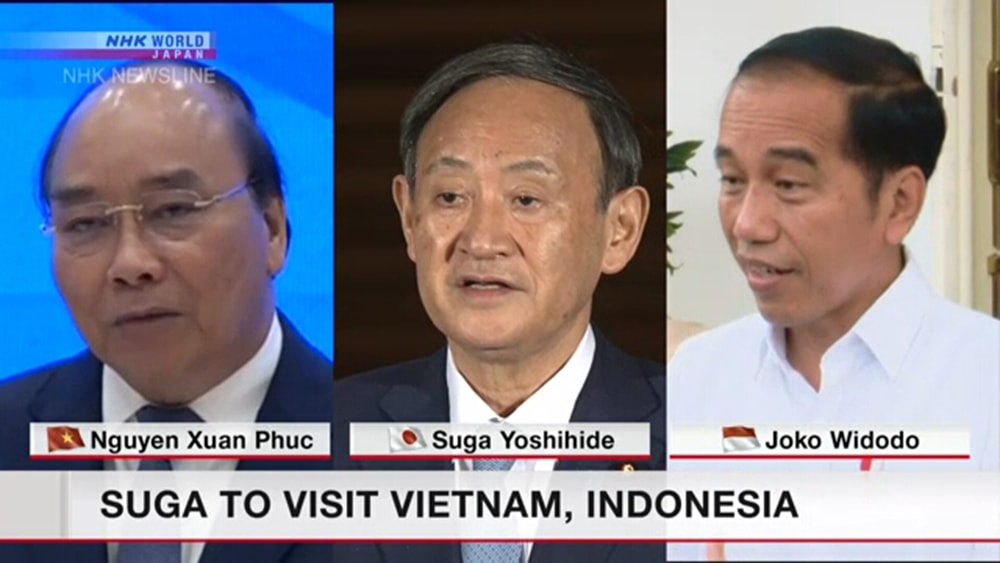The first 'competence test' of new Japanese Prime Minister Suga
(Baonghean.vn) - New Japanese Prime Minister Yoshihide Suga is on his first overseas trip since taking office with two surprising destinations: Vietnam and Indonesia. This trip has attracted special attention from the international public, as many people want to see how Japan's new leader will demonstrate his diplomatic vision, especially in a region considered one of the most important "geopolitical arenas" in the world.
Following in the footsteps of his predecessor
Since taking power 1 month ago,Japanese Prime Minister Yoshihide SugaHe has held numerous phone calls with world leaders and met face-to-face with senior foreign government officials to dispel doubts about whether he can continue his predecessor's legacy.Abe Shinzo, because he is considered to have very little experience in the field of foreign affairs. But in terms of significance, these activities cannot be compared to the first foreign trip - an event that always attracts special attention from any head of state.
 |
| Japanese Prime Minister Yoshihide Suga. Photo: Reuters. |
When Prime Minister Yoshihide Suga planned this trip, there was a lot of speculation about his choice: It could be the US - the priority destination of every new Japanese Prime Minister since 1945, it could be China - Japan's largest economic partner, or it could be South Korea - a country that is also an ally of the US and shares many regional security visions with Japan. But all of these potential destinations were ultimately not chosen for both objective and subjective reasons: The US was not suitable in terms of timing when the Covid-19 epidemic broke out and the important election was about to begin; China was also not a suitable choice politically given the current difficult bilateral relationship, when Chinese President Xi Jinping's plan to visit Japan was postponed; Meanwhile, the destination of South Korea is not highly appreciated at this time, and is even considered "political suicide" after Prime Minister Suga recently made a rather tough statement with South Korea on the issue of compensation for wartime labor.
However, the choice of Vietnam and Indonesia for Prime Minister Yoshihide Suga's first trip is not simply a replacement, but behind it is a clear message about the foreign policy focus of the new administration in Japan. It should be recalled that in 2013, former Japanese Prime Minister Abe Shinzo also chose Vietnam as his first destination right after taking office. That was also a time when the regional situation was very volatile, and the Asia-Pacific region emerged as a region of strategic significance in the policies of many countries, including the pivot policy of the administration of former US President Barack Obama. For Japan, former Prime Minister Abe Shinzo also put forward a Vision for an open and free Indo-Pacific region, focusing on economic, cultural and law enforcement activities to ensure maritime security, towards a stable and prosperous region.
 |
| Japanese Prime Minister Yoshihide Suga held talks with Vietnamese Prime Minister Nguyen Xuan Phuc and Indonesian President Joko Widodo during his first official visit. Photo: NHK |
This vision continues to be inherited and promoted under Prime Minister Suga, so choosing Vietnam and Indonesia as destinations for his first overseas trip is also an affirmation of Mr. Suga's continuation of his predecessor's foreign policy. Before the visit, Mr. Suga also announced at a meeting of the ruling Liberal Democratic Party that ASEAN is located at the center of the Indo-Pacific region, and has an important position in the Free and Open Indo-Pacific Vision. Within ASEAN, Vietnam is the country holding the rotating Chairmanship in 2020, while Indonesia is the country with the largest economy in the bloc with more than 260 million people and is currently the only member of the bloc to be in the group of 20 countries with the most developed economies in the world (G20). In addition, Vietnam and Indonesia are said to share many concerns with Japan on regional security issues.
Efforts to "escape China"
Although Japan has never mentioned the China factor in the visit of new Prime Minister Yoshihide Suga, analysts all believe that choosing two countries with prominent roles inASEANis a hidden message, demonstrating Japan's determination to face the rising China in the region. During the trip, Japanese Prime Minister Yoshihide Suga held talks with Vietnamese Prime Minister Nguyen Xuan Phuc and Indonesian President Joko Widodo. One of the key contents mentioned in the discussions was promoting economic cooperation. Specifically, during the stop in Vietnam, Mr. Suga focused on agreements to promote free trade, diversify supply chains and strengthen security cooperation. Meanwhile, during the stop in Indonesia, Mr. Suga will resume agreements on labor exchange between the two countries - which were interrupted by the Covid-19 pandemic, promoting "2+2" dialogues on defense and diplomatic issues.
 |
| Economic cooperation is one of the key contents of Mr. Suga's first trip abroad. Photo: Discourse |
The focus on economic cooperation with Vietnam and Indonesia is both a way for Mr. Suga to promote one of the most important pillars of the Free and Open Indo-Pacific Vision, and a way to realize Japan's new strategy since the Covid-19 outbreak, which is the strategy of diversifying the supply chain, reducing the dependence of the Japanese economy on China, building a stable supply system for medical materials and electronic components even in emergencies. Although this strategy was introduced during the time of former Prime Minister Abe Shinzo, Mr. Yoshihide Suga at that time also repeatedly emphasized the need to overcomeJapanese economyover-reliance on a particular country's supply chain.
In this “exit China” strategy, Japan has announced two subsidy programs: the first program subsidizes about 2 billion USD for Japanese enterprises to move production activities from China back to Japan; the second program subsidizes more than 200 million USD for enterprises to move production facilities from China to ASEAN member countries (later, Japan added two more locations to this list: India and Bangladesh). Large enterprises participating in the program will receive support equal to half of the investment cost when moving production to ASEAN countries, while the support for smaller enterprises is up to 2/3 of the total investment cost. This plan was once again mentioned by Mr. Yoshihide when he visited Vietnam and Indonesia during this trip, considering this as an opportunity for Vietnam and Indonesia to receive investment from Japanese enterprises that are restructuring their production networks.
 |
| Mr. Suga continues to pursue the Free and Open Indo-Pacific Vision from the time of former Prime Minister Abe. Photo: Foreign Policy |
According to analysts, the four-day trip to Vietnam and Indonesia is the first opportunity for Mr. Yoshihide Suga to demonstrate his diplomatic style after becoming Prime Minister of Japan, and is the beginning of forming a diplomatic philosophy on a more general scale after resuming diplomatic activities with other regions in the "post-Covid-19" period. Mr. Suga said that he will shape his own diplomatic style, but whatever that style is, the biggest goal is still to inherit the great vision from Mr. Abe's time, which is to make Japan a "flagship" in building an open and free Indo-Pacific region.

